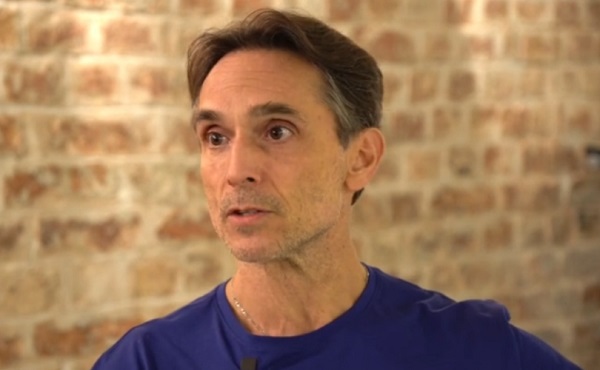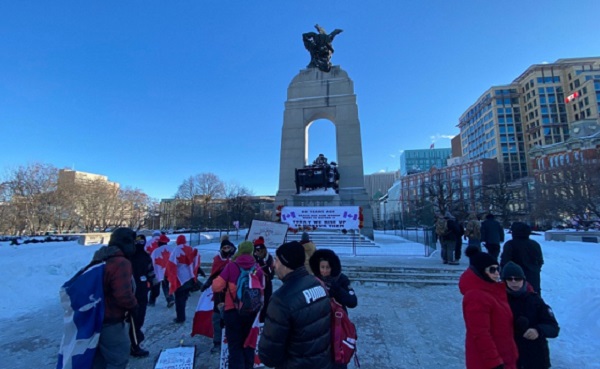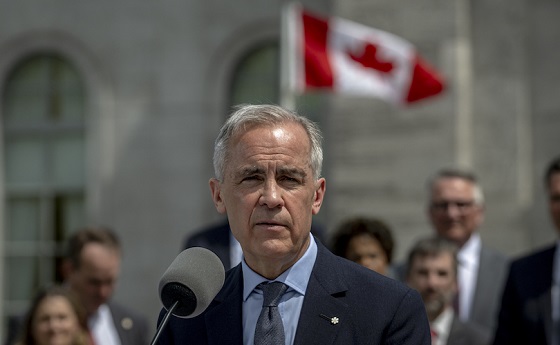COVID-19
Dr. Trozzi appeals revocation of his medical license in ‘existential moment’ for Ontario courts

Dr. Mark Trozzi
From LifeSiteNews
Tuesday, outspoken COVID science critic Dr. Mark Trozzi will appeal a decision to take away his medical license. Due to a new legal standard, a successful outcome may positively impact Canada ‘in all domains of government regulation.’
Medical freedom champion Dr. Mark Trozzi will present his legal case on Tuesday when he appeals the stripping of his medical license in January by the College of Physicians and Surgeons of Ontario (CPSO).
The case will be heard by the Ontario Divisional Court (ODC) and, according to attorney Michael Alexander, a successful result would have far-reaching legal implications impacting freedom of expression rights across “all domains of government regulation,” including all health colleges.
Appearing in a late September interview with Canadian politician Derek Sloan, Alexander explained the history of the case leading up to the revoking of Trozzi’s license on January 25. In their view, “the college was primarily concerned … that Mark had been making statements about COVID-19 science and public policy that amounted to ‘misinformation’ and he was misleading the public and in doing so causing harm.”
It was also relevant that Trozzi was not even in practice at this time but had taken a sabbatical to study these issues more carefully and start a daily newsletter regarding his research.
The concern of CPSO “was the substance of his views,” the attorney assessed, “so they wanted to censor him in some way” and “eventually took him to a discipline hearing where he was found to be unprofessional, incompetent, and in violation of the standard of practice in the profession, primarily because he just presented an alternative point of view.”
READ: Dr. Trozzi stripped of medical license over COVID stance, plans to appeal
Ironically, Trozzi was not able to be present for the interview himself because he was traveling in Japan, with an invitation to speak before its parliament. He had already addressed the Romanian parliament on issues related to the COVID-19 response.
While the highly regarded former emergency room specialist “is a persona non grata in Ontario,” Dr. Trozzi’s attorney observed, “he’s in high demand around the world as someone who is providing important insights into the whole COVID era, COVID science, COVID public policy, and his criticisms are taken very seriously.”
“We have to ask ourselves what the authorities in Ontario are doing when in other parts of the world serious people are taking Dr. Trozzi’s criticisms very seriously,” Alexander proposed.
Trozzi case could impact ‘the country in all domains of government regulation’
For more than three decades, the Ontario Divisional Court has been legally directed to judge such cases only according to a low-threshold standard called “reasonableness” that Alexander describes as the court basically deferring to the judgment of such regulatory tribunals as CPSO with regard to facts, the law, and “particularly on the interpretation of the law that the tribunal adopts.”
What makes this case different is that since Trozzi has a “statute-based right to appeal” and thus a 2019 Supreme Court decision now requires the ODC to adopt a higher standard, referred to as “correctness,” in examining the CPSO decision.
Therefore, according to this new standard, “you must get all findings of fact correct, you must get every interpretation of your statute correct, you must interpret all case law correctly,” Alexander explained.
“So, the CPSO has never had to face this before, and this (case) is the first major fundamental challenge to a regulatory body on this standard of correctness in Ontario,” he continued. Thus, this case is “extremely important. If we were to win, it would affect the whole regulatory framework of the province in a positive way.”
“So these same judges, who have been cutting a lot of slack to the College of Physicians in particular, are now going to be facing similar issues that they have faced before but on this new standard of correctness,” the attorney said. “So they are going to have to adopt a completely different mindset in assessing the case.”
Therefore, “I guess you could say (this is) an existential moment for the judiciary in Ontario,” Alexander proposed. “I mean will the Divisional Court step up to the plate and fully apply the standard of correctness and have the courage to do it?”
According to Alexander, a successful outcome in this case “would have a ripple effect not just in Ontario for the 22 health colleges here but for the health colleges all across the country,” forcing them to reconsider their policies in this regard.
And given the case regards the fundamental freedom of expression, a successful outcome on these arguments “would have an impact across the country in all domains of government regulation.”
“So this is not a case that’s just about Mark,” the attorney clarified. “We are trying to change the way this country is governed, and the college’s case has given us that opportunity.”
In 2020 during the “pandemic,” Trozzi, an ER veteran of 25 years, noticed that the mainstream narrative surrounding the public health “emergency” was deeply flawed. While media reported overflowing emergency rooms, Trozzi’s hospital remained relatively empty. This inspired him to research the science facts of COVID.
In the interest of protecting not only his own patients but people everywhere, Dr. Trozzi promoted alternative COVID-19 treatments and publicly explained why the COVID shot is “not a vaccine.”
In retaliation, Dr. Trozzi was barred from issuing medical exemptions for COVID-19 shots, masking requirements and testing in 2021. He was not alone: Ontario’s Dr. Rochagne Kilian was also similarly barred.
At the time, CPSO said the interim orders were given in accordance with the Regulated Health Professions Act, which allow restrictions on a member’s license if a regulator believes a certain practice “exposes or is likely to expose patients to harm or injury.”
The CPSO has cracked down on numerous physicians who failed to comply with standard protocol during the COVID outbreak. It has done this so assiduously that last year Dr. Robert Malone spoke out against what he described as the “re-education” of dissident Canadian doctors.
The CPSO has thus far initiated legal action against Trozzi and at least five other doctors who are committed to their Hippocratic Oath responsibilities related to COVID: Mary O’Connor, Kilian, Celeste Jean Thirlwell, Patrick Phillips, and Crystal Luchkiw.
Alexander also made clear that while the CPSO has the typical governmental “blank check” of “unlimited resources,” including “around 10 lawyers on staff” and “access to outside council,” he is in need to hire “clerks to do special kinds of filing” and is seeking free-will donations.
Having donated “hundreds of thousands of dollars of billable time” into this case, Alexander has no regrets, stating that “it’s too important to the country not to litigate and we are the ones who pioneered this approach, and so it’s us or nobody.”
To assist Dr. Trozzi in winning his precedent-setting case, please donate here.
COVID-19
Canadian veteran challenges conviction for guarding War Memorial during Freedom Convoy

From LifeSiteNews
When the convoy first came to Ottawa, allegations were floated that the memorial had been desecrated. After learning of this, Evely quickly organized a group of veterans to stand guard around the clock to protect the area.
A Canadian veteran appealed to the Ontario courts after he was convicted for organizing a guard around the National War Memorial during the Freedom Convoy.
In an October press release, the Justice Centre for Constitutional Freedoms (JCCF) announced that an appeal has been filed in the Ontario Court of Appeals on behalf of Master Warrant Officer (Ret’d) Jeffrey Evely over his conviction for mischief and obstructing police while on his way to guard the Ottawa War Memorial during the 2022 Freedom Convoy.
“By locking down large sections of downtown Ottawa, the police were effectively preventing all civilians from accessing public areas and greatly exceeded their powers under the common law,” constitutional lawyer Chris Fleury explained.
“This case raises issues that have implications for protests across the province and the country. We are hopeful that the Ontario Court of Appeal will agree and grant leave to appeal,” he added.
The appeal argues that police overstepped their authority in their response to the 2022 protest of COVID mandates. Police actions at the time included locking down the Ottawa core, establishing checkpoints, and arresting protesters.
In September 2024, Everly was convicted of mischief and obstruction after his involvement in the 2022 Freedom Convoy, which protested COVID mandates by gathering Canadians in front of Parliament in Ottawa.
As LifeSiteNews previously reported, when the convoy first came to Ottawa, allegations were floated that the memorial had been desecrated. After learning of this, Evely quickly organized a group of veterans to stand guard around the clock to protect the area.
However, under former Prime Minister Justin Trudeau’s use of the Emergencies Act, many parts of downtown Ottawa were blocked to the public, and a vigilant police force roamed the streets.
It was during this time that Evely was arrested for entering a closed off section of downtown Ottawa during the early hours of February 19, 2022. He had been on his way to take the 4:25 a.m. shift protecting the Ottawa War Memorial.
As Evely walked to the memorial, he was allegedly told to stop by police. According to the police, Evely “ran for a short distance before being confronted by two additional police officers.”
He was forcibly pushed to the ground, landing face first. The veteran was then arrested and charged with mischief and obstructing police.
At the time, the use of the EA was justified by claims that the protest was “violent,” a claim that has still gone unsubstantiated.
In fact, videos of the protest against COVID regulations and shot mandates show Canadians from across the country gathering outside Parliament engaged in dancing, street hockey, and other family-friendly activities.
Indeed, the only acts of violence caught on video were carried out against the protesters after the Trudeau government directed police to end the protest. One such video showed an elderly women being trampled by a police horse.
While the officers’ actions were originally sanctioned under the EA, Federal Court Justice Richard Mosley ruled that Trudeau was “not justified” in invoking the EA, forcing Crown prosecutors to adopt a different strategy.
Now, Crown prosecutors allege that the common law granted police the authority to stop and detain Evely, regardless of the EA.
However, Evely and his lawyers have challenged this argument under section 9 of the Canadian Charter of Rights and Freedoms, insisting that his “arrest and detention were arbitrary.”
Earlier this month, Freedom Convoy organizers Tamara Lich and Chris Barber were sentenced to 18-month house arrest after a harrowing 25-month trial process. Many have condemned the sentence, warning it amounts to “political persecution” of those who stand up to the Liberal government.
COVID-19
Freedom Convoy leader Tamara Lich says ‘I am not to leave the house’ while serving sentence

From LifeSiteNews
‘I was hoping to be able to drop off and pick up my grandsons from school, but apparently that request will have to go to a judge’
Freedom Convoy leader Tamara Lich detailed her restrictive house arrest conditions, revealing she is “not” able to leave her house or even pick up her grandkids from school without permission from the state.
Lich wrote in a X post on Wednesday that this past Tuesday was her first meeting with her probation officer, whom she described as “fair and efficient,” adding that she was handed the conditions set out by the judge.
“I was hoping to be able to drop off and pick up my grandsons from school, but apparently that request will have to go to a judge under a variation application, so we’ll just leave everything as is for now,” she wrote.
Lich noted that she has another interview with her probation officer next week to “assess the level of risk I pose to re-offend.”
“It sounds like it’ll basically be a questionnaire to assess my mental state and any dangers I may pose to society,” she said.
While it is common for those on house arrest to have to ask for permission to leave their house, sometimes arrangements can be made otherwise.
On October 7, Ontario Court Justice Heather Perkins-McVey sentenced Lich and Chris Barber to 18 months’ house arrest after being convicted earlier in the year convicted of “mischief.”
Lich was given 18 months less time already spent in custody, amounting to 15 1/2 months.
As reported by LifeSiteNews, the Canadian government was hoping to put Lich in jail for no less than seven years and Barber for eight years for their roles in the 2022 protests against COVID mandates.
Interestingly, Perkins-McVey said about Lich and Barber during the sentencing, “They came with the noblest of intent and did not advocate for violence.”
Lich said that her probation officer “informed me of the consequences should I breach these conditions, and I am not to leave the house, even for the approved ‘necessities of life’ without contacting her to let her know where I’ll be and for how long,” she wrote.
“She will then provide a letter stating I have been granted permission to be out in society. I’m to have my papers on my person at all times and ready to produce should I be pulled over or seen by law enforcement out and about.”
Lich said that the probation officer did print a letter “before I left, so I could stop at the optometrist and dentist offices on my way home.”
She said that her official release date is January 21, 2027, which she said amounts to “1,799 days after my initial arrest.”
As reported by LifeSiteNews, Lich, reflecting on her recent house arrest verdict, said she has no “remorse” and will not “apologize” for leading a movement that demanded an end to all COVID mandates.
LifeSiteNews reported that Conservative Party leader Pierre Poilievre offered his thoughts on the sentencing, wishing them a “peaceful” life while stopping short of blasting the sentence as his fellow MPs did.
In early 2022, the Freedom Convoy saw thousands of Canadians from coast to coast come to Ottawa to demand an end to COVID mandates in all forms. Despite the peaceful nature of the protest, Trudeau’s government enacted the never-before-used Emergencies Act (EA) on February 14, 2022.
-

 Alberta8 hours ago
Alberta8 hours agoFrom Underdog to Top Broodmare
-

 International19 hours ago
International19 hours agoPrince Andrew banished from the British monarchy
-

 Alberta2 days ago
Alberta2 days agoNobel Prize nods to Alberta innovation in carbon capture
-

 Business1 day ago
Business1 day agoCanada’s attack on religious charities makes no fiscal sense
-

 Business18 hours ago
Business18 hours ago“We have a deal”: Trump, Xi strike breakthrough on trade and fentanyl
-

 Bruce Dowbiggin1 day ago
Bruce Dowbiggin1 day agoGet Ready: Your House May Not Be Yours Much Longer
-

 Crime18 hours ago
Crime18 hours agoCanada Seizes 4,300 Litres of Chinese Drug Precursors Amid Trump’s Tariff Pressure Over Fentanyl Flows
-

 National2 days ago
National2 days agoCanadian MPs order ethics investigation into Mark Carney’s corporate interests









